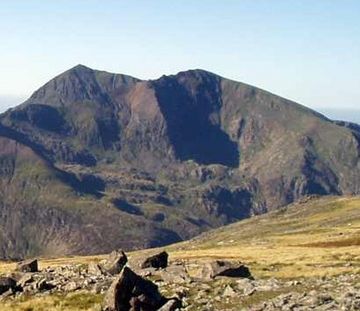Garnedd Ugain facts for kids
Quick facts for kids Garnedd Ugain |
|
|---|---|

Garnedd Ugain (right) and Snowdon (left)
|
|
| Highest point | |
| Elevation | 1,065 m (3,494 ft) |
| Prominence | 72 m (236 ft) |
| Parent peak | Snowdon |
| Listing | Hewitt, Welsh 3000s, Nuttall, Furth |
| Naming | |
| English translation | Cairn of the Twenty |
| Language of name | Welsh |
| Geography | |
| Location | Gwynedd, Wales |
| Parent range | Snowdonia |
| OS grid | SH610551 |
| Topo map | OS Landranger 115 |
Garnedd Ugain, also known as "Crib-y-Ddysgl", is a pyramid-shaped mountain in Wales. It is part of the large Snowdon Massif mountain group. This makes it the second highest peak in Wales. It sits less than one kilometre north of the very top of Snowdon.
Garnedd Ugain is a key part of the famous Snowdon Horseshoe walking route. It connects to Crib Goch by a low point called Bwlch Coch. It also links to the Snowdon summit through another low point named Bwlch Glas. A steep ridge called Clogwyn y Person connects it to Cwm Glas in the northeast. This ridge joins the main Crib y Ddysgl ridge about 500 metres (1,600 feet) east of the summit.
What's in a Name?
Both Garnedd Ugain and Crib-y-Ddysgl are names you will see on maps of this area. The name Crib-y-Ddysgl usually refers to the mountain's east ridge. The actual summit, or top, is called Garnedd or Carnedd Ugain.
Meaning of Crib-y-Ddysgl
The name Crib-y-Ddysgl means "ridge of the dish" in the Welsh language. This name is used by mountain experts like Alan Dawson. He uses it when listing the peak as a Hewitt. A Hewitt is a mountain in England, Wales, or Ireland that is over 2,000 feet (610 metres) high.
Meaning of Carnedd Ugain
The Welsh name Carnedd Ugain means "Cairn of the Twenty". A cairn is a pile of stones often used as a landmark. The word Garnedd is just a slightly changed form of Carnedd in Welsh.
This name might come from the Roman legion that was based in Caernarfon long ago. Another idea is that the name could be a changed version of "Carnedd Wgon". This might mean it was named after a prince called Wgon. He was written about by a famous poet named Dafydd ap Gwilym. It could also be named after a poet from the 13th century, Gwgon Brydydd.
 | Kyle Baker |
 | Joseph Yoakum |
 | Laura Wheeler Waring |
 | Henry Ossawa Tanner |

